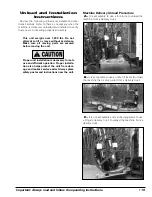
16 •
Important: Always read and follow the operating instructions.
Maintenance
Instructions
Read and follow all the maintenance instructions pro-
vided in this manual to keep the machine in good oper-
ating condition. Refer to the other materials received
with the unit and to the service bulletins from the man-
ufacturer for additional instructions on proper mainte-
nance and service. Regular inspections and proper
maintenance are essential to preventing accidents and
injuries.
Before making any inspection, adjustment,
or repair, disconnect the power source and
block out all moving parts to prevent injury.
Keep the machine and the immediate work
area clean. Do not use compressed air to
remove dirt and debris from the machine.
Foreign material may be propelled into the
air and into operator or bystander causing
personal injury.
Wear protective clothing, equipment and
eye protection when making any adjust-
ments or repairs to the machine.
A.
The vertical and horizontal slides and the helper
slides should be cleaned with a vaporizing solvent and
then lubricated with chassis grease once a month.
B.
Check the adjustment of the Duckhead once a
month.
C.
The transmission in this machine is a sealed unit
packed with grease and should need no normal main-
tenance.
D.
The tabletop, clamps, steel Duckhead, and other
working surfaces should be cleaned with a vaporizing
solvent every month.
E.
Inspect clamps. If using Max-Grip™
clamps then
replace any worn or damaged grips and covers or if
using other clamps then remove metal chips and dirt
from the serrations with a wire brush every month.
F.
Check the tire pressure gauge function daily, and
check the accuracy monthly. Use a pressurized tire and
a high quality stick-type pressure gauge. If necessary,
adjust the dial of the machine gauge. If the gauge is
defective, replace it immediately (part number
107985). Contact COATS at (615) 641-7533. Check
function of the pressure limiter weekly. Always rein-
stall the lens after adjusting the gauge.
G.
Make sure all fasteners are securely tightened.
H.
Make certain that all guards and covers are in
place.
I.
Check for worn, damaged or missing parts includ-
ing grips and protective covers. Replace them before
allowing the unit to be used.
J.
On a daily basis, inspect the unit and check to be
certain that all systems are operating normally.
Detailed inspection and testing procedures are speci-
fied for various components at regular intervals. Set up
a chart and assign responsibility for these items.
Replace any damaged or missing safety
decals. They are available from COATS, (800)
688-6359.
Important:
These instructions will help you service
the unit. Instructions are for a person with some
mechanical ability and training. No attempt has been
made to describe all basic steps. For example, how to
loosen or tighten fasteners. Also basic procedures
such as cycling systems and checking operation of the
equipment are not fully described since they are
known to anyone who does mechanical and service
work. Do not attempt to perform work beyond your
ability or at which you have no experience. If you need
assistance, call an authorized service center or contact
COATS directly, (800) 688-6359.


























